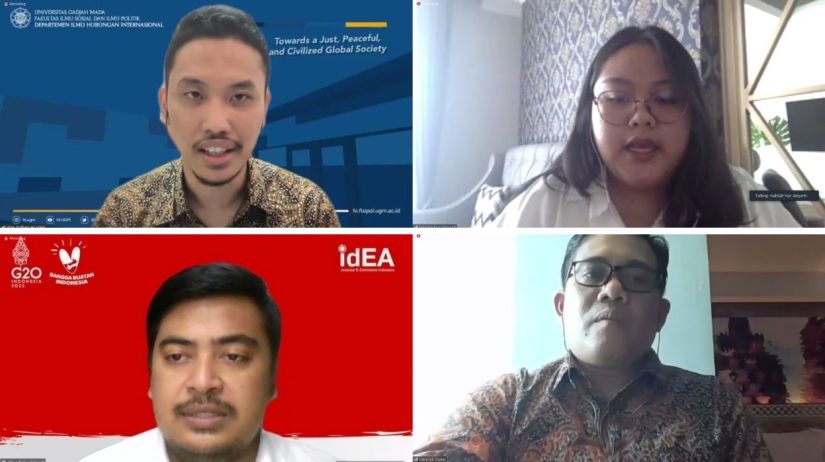
Yogyakarta, July 29th 2022─In support of the series of activities “G20 Indonesian Presidency: Leadership for a Just and Sustainable World Order”, the Faculty of Social and Political Sciences (FISPOL) UGM held an online series of FGDs or Focus Group Discussions on Friday (29/7). This third FGD was moderated by Muhammad Irfan Ardhani, MIR (Lecturer of International Relations UGM) and raised the topic of discussion “Global Digital Transformation in the G20 Agenda: Towards an Inclusive and Sustainable Digital Economy Development”. FISIPOL UGM invited four speakers to discuss and provide recommendations regarding the problems in the global digital transformation agenda. The four speakers were the Coordinator of the IIS UGM Research Division, Nabilah Nur Abiyanti; Director of Digital Economy Ministry of Communication and Informatics, Dr. Ir. I Nyoman Adhiarna, M. Eng; Head of Public Policy and Government Relations in Indonesian E-Commerce Association/IdEA, Rofi Uddarojat; and a digital policy researcher, Wahyudi Djafar.
Nabilah Nur Abiyanti started the discussion by explaining the background of global digital transformation. According to him, digitalization, especially in the economic field, can provide various positive impacts. Efficiency, social inclusivity, market expansion, and job search are the impacts that can be felt if digital transformation is carried out fairly. “Indonesia as a country that holds the G20 Presidency has the opportunity to explore this digital-based economy,” Nabilah said. Nabilah, together with Treviliana Eka Putri (Lecturer of International Relations of UGM), will also release a chapter book that discusses similar topics.
Responding to this, Muhammad Irfan Ardhani, MIR said that it was important to then make this digital transformation agenda a consensus for its member countries. This is also agreed by Dr. Ir. I Nyoman Adhiarna, M. Eng. According to him, the biggest challenge is how to bring this discussion to a place that can be mutually agreed upon. “The G20 is very diverse. There are developed and developing countries with different interests,” Nyoman said.

In fact, digital transformation is indeed a complex issue. From a business perspective, as stated by Rofi Uddarojat, digital transformation also involves data localization. According to him, it is important for digital data to be accommodated domestically instead of abroad. This is because data localization is able to facilitate local businesses and create competitiveness. Meanwhile, in the regulatory realm, Wahyudi Djafar emphasized the importance of developing a digital authority to ensure legal certainty. Finally, Djafar also argues that the nature of the internet and digitalization is inclusion. Therefore, it is very significant for business people to prioritize inclusiveness in their business practices.
